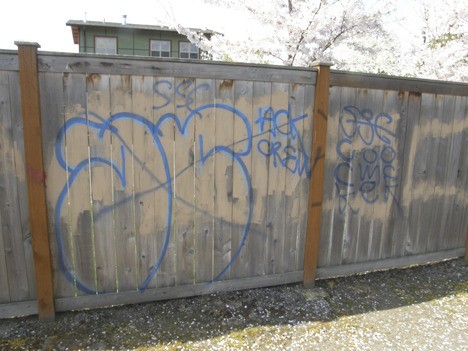The back fence and garbage cans of one Harvey Road business have been tagged repeatedly with graffiti — in this case, clearly the mark of gang wannabes hot and eager to prove their mettle.
“Fed up” is the most polite way to describe how the victims feel about it.
“Last time they wrote the F-word, which is really pleasant when we have people who drive out that way and they see garbage cans with profanity on them,” said an exasperated employee. “The back fence gets painted, the next day it gets tagged again.”
William Sutton’s dental offices on Harvey Road were first tagged in January 2009. The City sent out a letter warning Sutton of a fine if the graffiti weren’t painted over in 15 days.
“It happened, we painted it out, it happened again in February, we painted it out,” said office manager Rondy Sutton. “You have to report it every time to the police. When it happened the third time, I told the City I wasn’t going to repaint it because anybody moving to Auburn should see what they are moving into.”
They are not alone, and the frustration is palpable.
In Auburn as elsewhere, graffiti is fast becoming a serious problem, on the flat and in the hills. It debases neighborhoods, reduces property values and in general trashes the place out. Not only does graffiti shatter a neighborhood’s sense of security, it hurts neighborhood pride, sapping the willingness of property owners to keep up their houses and the quality of life in the neighborhood.
Taggers at work
What matters more, graffiti is often a sign that gangs like the Surenos or Crips are moving into a neighborhood, trying to establish their turf. But it’s not always gangs, Auburn Police Officer Brian O’Neill advised a gathering of seniors at the Auburn Senior Center on Wednesday.
“There are taggers who are not gang members, they just like to paint on things that are not theirs,” O’Neill said. “…It’s not telling you anything about a gang. Gang-related stuff looks like alpha-numeric stuff or bizarre-looking alpha numeric stuff.
“… The tagging is meant as publicity for gangs,” O’Neill added. “It’s also recruitment. You want to join the gang, tagging is one more way and usually a good sign that they are recruiting.”
By city ordinance, it is illegal to possess graffiti producing items with the intention of using them to deface public or private property. The Auburn City Code also requires elimination of the graffiti within 15 days of the date of notice.
The City of Auburn has launched an anti-graffiti campaign to encourage people to report graffiti, deal with it swiftly and volunteer for anti-graffiti efforts.
Whereas in most communities the property owner must remove the graffiti at his or her own expense, the City and Parker Paint on East Main Street have a different idea — allow the property owner, government and private business to work together to deal with the problem.
According to the City’s Web site, people whose property has been tagged receive one gallon of paint. In some cases, the paint store may offer to provide paint remover or stain rather than paint. It will try to match the paint obtained to that covering the surface to be painted but needs 24 hours and a chip or sample.
Persons selecting a type of paint other than that offered will have to buy their own.
No reimbursements, refunds or credits are made to property owners, and the program limits the property owner to one gallon of paint per property owner per six-month period. The City pays for the voucher through Community Development Block Grants.
“We have created a voucher system to where we now recognize the graffiti recipient as a victim,” said Auburn Code Enforcement Officer Chuck Joiner. “If we get a report, we confirm it, and we issue the voucher. This gets them a gallon of paint and a brush and a graffiti kit at no cost to them. But they have to remove it; we can’t remove the graffiti for them.”
Program helping
Auburn Mayor Pete Lewis said the program is working well.
“I’ve got these citizen volunteers who are really taking on parts of the city,” said Lewis. “They’ve got the different kind of paints, and as soon as somebody tags it, they just come out and either wash it off or paint it out. They do it over and over, and they are great. What we want is for people to call, so we can come down and take pictures to see if it’s some kind of gang thing or just a kid thing … If they can’t paint it, there’s a volunteer group that will paint it out.
“Mainly what this is is a couple of adults, bad guys who are attempting to recruit folks, so they have been doing this tagging in an attempt to recruit,” Lewis said. “The last one attempting to recruit ended up in some King County facilities for a year or more. And there’s one that has been out who I’ve been told may be considering going to another area. It’s a serious problem if we don’t take it seriously. But the work the community is doing has made an incredible difference.”
Rondy Sutton is not convinced. She said that the City could do a better job going after the bad guys.
“The City knows who’s doing it, they know the gang, they know what’s going on. They need to take care of it. And they shouldn’t handle it the way they chose to handle it by sending us a letter saying we would be fined,” Sutton said. “I think they’re trying, but you just have to do something. People have to stop getting away with it.”
To report graffiti happening, call 911. To report existing graffiti, call 253-931-3048, ext. 7.



